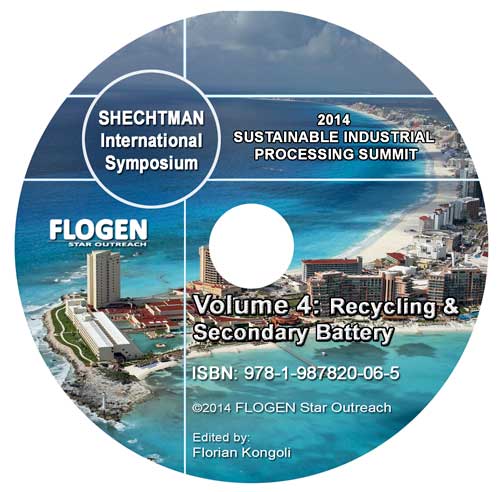2014-Sustainable Industrial Processing Summit
SIPS 2014 Volume 4: Recycling & Secondary Battery
| Editors: | Kongoli F |
| Publisher: | Flogen Star OUTREACH |
| Publication date: | 20 December 2014 |
| Pages: | 498 pages |
| ISBN: | 978-1-987820-06-5 |
| ISSN: | 2291-1227 (Metals and Materials Processing in a Clean Environment Series) |

CD shopping page
Heat Generation and Conduction Studies of Li-Ion Batteries
Qing Hao1; Candace Chan2; Evan R. Segal1;1UNIVERSITY OF ARIZONA, Tucson, United States; 2ARIZONA STATE UNIVERSITY, Tempe, United States;
Type of Paper: Invited
Id Paper: 280
Topic: 12
Abstract:
The rechargeable Li-ion battery market was approximately $11.8 billion in 2010 and it is expected to grow to $53.7 billion in 2020. In the past few years, however, millions of Li-ion batteries were recalled by various manufacturers (e.g., Sony and GM) due to safety concerns, which also led the U.S. battery company A123 Systems to file for bankruptcy in 2012. The most recent Li-ion battery fires on the Boeing 787 Dreamliner airplane have drawn even more attention to the battery safety issue. Currently, the highest priority for manufacturers has been switched from the energy density and cost of Li-ion batteries to their thermal safety, reliability, and durability. As the major components of a Li-ion battery, the cathode and anode are responsible for most heat generation and it is thus of significance to better understand the associated heat generation and transport processes within these regions. In the literature, however, sufficient details for electrode thermal properties were only available for LiCoO2/C batteries (Sony US-18650) used for portable devices and inconsistencies still existed in these data due to the employed measurement technique. On the other hand, large divergence was also found in different heat generation tests of Li-ion batteries. In this work, we carry out systematic thermal conductivity measurements for LiCoO2 and LiFePO4 cathodes and equally important heat generation studies on various Li-ion batteries. These new experimental data will be compared with those previously used for Li-ion battery thermal simulations to better guide the future thermal designs of Li-ion batteries.